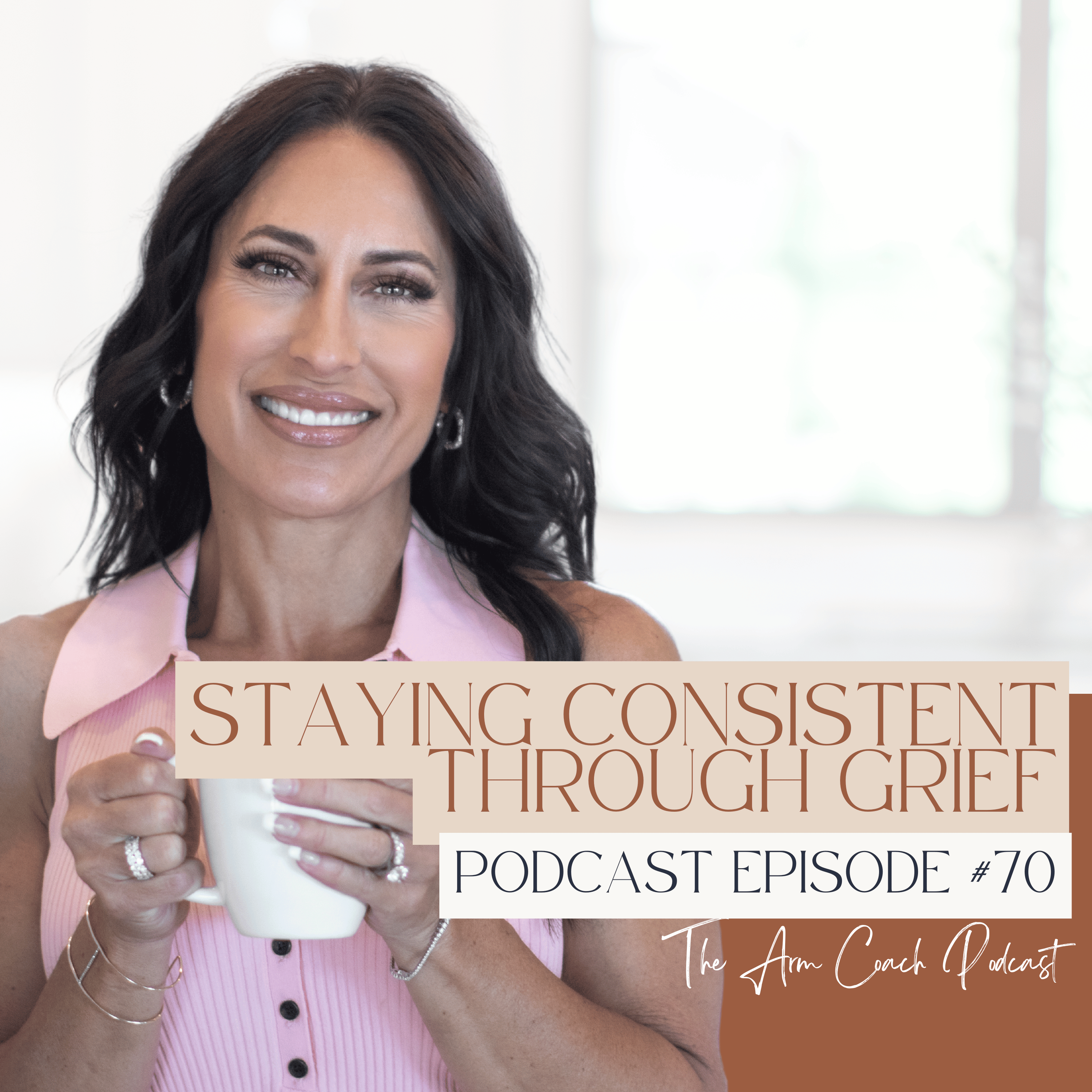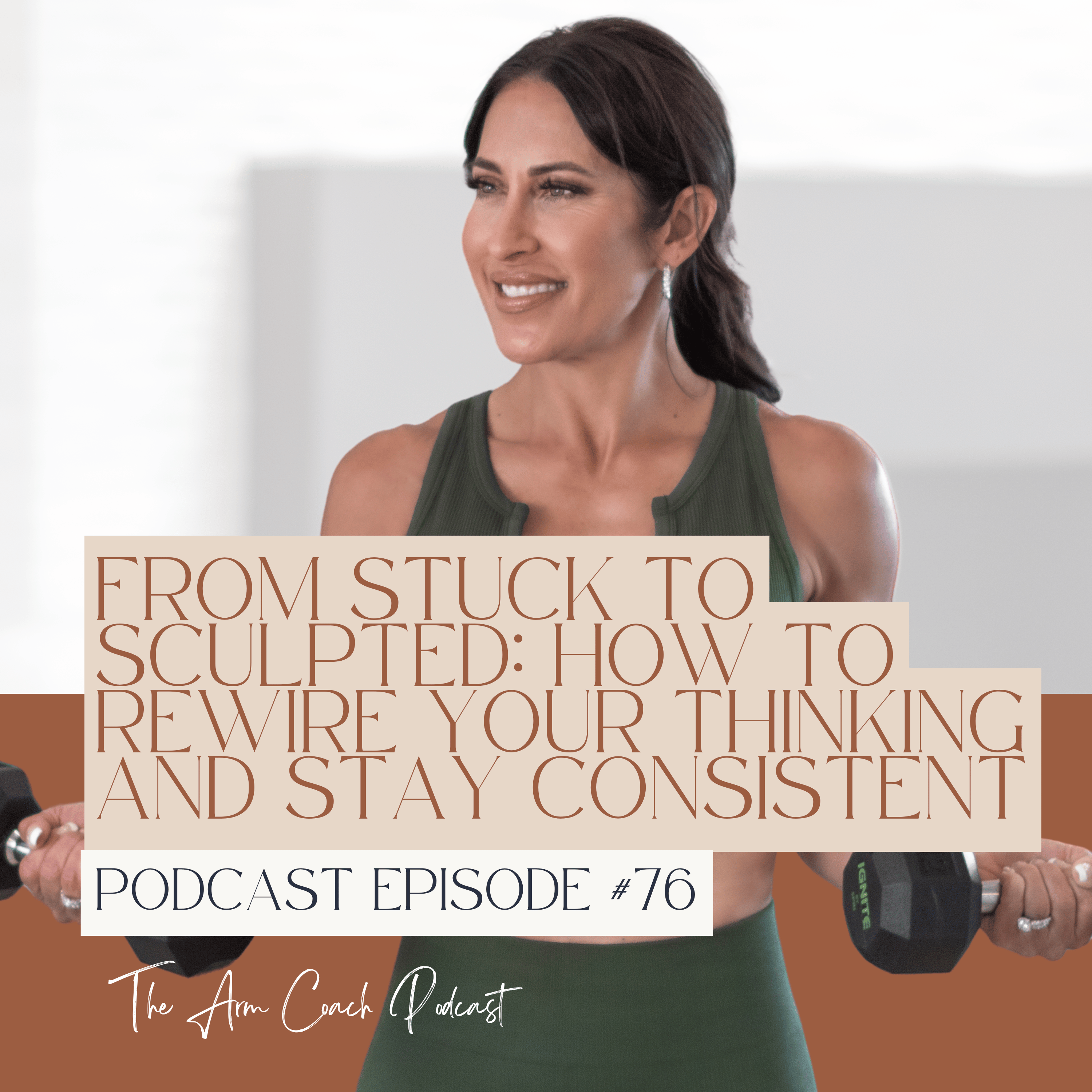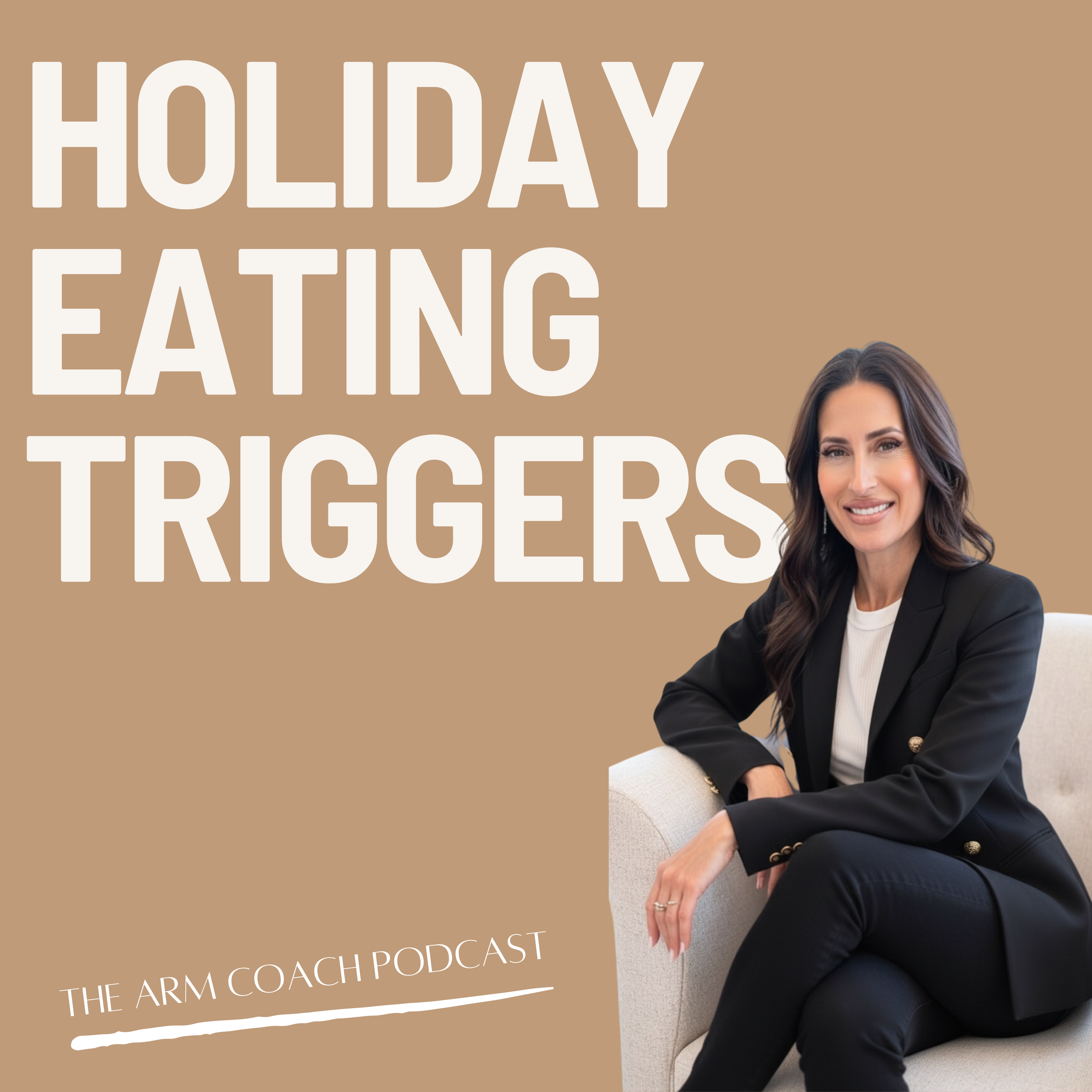Episode Transcript
What happens when you
tell yourself you can’t do
something? Are you calm
and accepting or do you
have a mental tantrum:
“It’s not fair! Why me?
This stinks.”
Today we’re looking at a
single thought that comes
up again and again for my
clients: “I can’t have that.”
And how this thought can
have unintended
consequences and keeps
us stuck with flabby arms.
Pause
Hi, everybody, and
welcome to The Arm
Coach podcast, episode
#17.
Before we get started I
wanted to remind you
that at the end of the
month I’m sending one of
you a $100 dollar Visa gift
card. It’s going to
someone who has written
a review for the Arm
Coach podcast. So if
you’re loving this
podcast, be sure to leave
a review on whichever
platform you’re listening.
So how are you? How are
you doing? I’m really
good, I’m back in the
midwest, spending time
with the granddaughters.
Kids are such a trip. I was
sitting on the couch and
one dragged over this
little toy piano she has,
dragged it over to me, sat
on the floor and started to
play the piano with her
feet and singing a song to
me. I love that little kids
are like I don’t need to sit
in front of a piano and
play with my fingers, I’m
going to sit and play with
my toes, so there. Who
cares?
I’ll tell you, as a life coach,
hanging out with a toddler
is so instructive because it
is the perfect way to
witness the unsupervised
brain in action. My coach
Brooke was the first one
to introduce me to this
idea, that you need to
actively supervise your
brain, and that’s what we
use life coaching tools for.
So the brain, when you
think about it, it’s on the
lookout for danger all the
time. That’s what kept us
alive back in the day,
seeing danger around
every corner was an
evolutionary advantage. It
prioritizes pleasure and it
wants to avoid discomfort
because both of these
things were linked to
survival, and the brain
wants to do all of this as
efficiently as possible, and
that’s why our brain loves
habits.
But sometimes, these
three things – seeking out
pleasure, avoiding pain,
and forming habits can
lead you in a direction that
you don’t want to go, like
eating too much, right? A
direction where you’re not
getting great results. So
you don’t like your flabby,
undefined arms, waking
up bloated and inflamed
or having all these empty
calories or worrying about
what the scale says or
having to wear something
to cover your arms. But
no one has ever shown
you how or given you the
tools to supervise your
brain.
So when you try to cut
back, it often doesn’t work
and what will happen is
you’ll make a little bit of
progress, and then you’ll
have a setback, and you’ll
find that you’ll flip-flop
back and forth between
the two; back and forth
between where you want
to go and where you
currently are. And most
people will do this: they
will start to tell themselves
that sculpted arms isn’t
possible. But it is
possible. It’s just that no
one has ever shown you
how to supervise your
brain. No one has ever
given you these tools.
So I was hanging out with
my granddaughter, she’s
2 and a half, so she
cannot supervise her own
brain. She needs my
daughter to help her do
that, and you know what?
My granddaughter is not
all that into being
supervised. This weekend
she was going around,
she had this spray bottle
full of water and she was
happily spraying
everything around the
house, including the cat,
and that’s when my
daughter intervened and
said, “Listen, you can
spray anything you want,
but you can’t spray the cat
with water.” She was so
mad, she was so mad,
her little face scrunched
up into a scowl and she
was not having it. She
wanted to spray whatever
she wanted to spray,
including the cat.
And it got me thinking
about how adults act
when we are told that we
can’t do something. So
we’re adults, we’re not
toddlers, so we’re
probably not throwing a
tantrum and stomping our
feet, but you know, a lot of
us are kind of doing that
on the inside, right? You
guys know what I’m
talking about. That kind of
silent tantrum inside your
head when somebody
tells you you can’t do
what you want to do.
So today I’m devoting an
episode to a single
thought, because I see
this thought come up
again and again with my
clients in regards to their
arm-sculpting nutrition,
and it came up for me too
when I was first working
on changing my eating
and my arms. But not only
that, not only do I see it
come up all the time, but I
see how it holds people
back and how it keeps
people stuck. It did that
for me, for a very long
time, and it made me feel
pretty terrible and a little
bit like I was having a
silent tantrum until I
learned to stop thinking it.
So the thought is, “I just
can’t eat that.” Have you
ever thought this to
yourself? Right? Have
you ever gotten so sick of
the repercussions from
eating too much that you
had this thought in the
back of your mind? ‘Well,
maybe I’m just one of
those people who can’t
stop when I eat those
things?’ I know I did. A lot
of people who struggle
with their eating to sculpt
their arms will at some
point think this thought,
usually after their efforts
to reign themselves in
doesn’t work. They’ll
think, maybe I’m just
someone who can’t stop
when I eat those things.
And if you’ve been on
diets in the past, you have
probably practiced this
thought. “I can’t eat that”
over and over and over
again to keep yourself in
line. I know I used it for an
entire decade when I was
trying to lose weight and
sculpt my arms. The
entire decade just telling
myself you can’t eat that,
you can’t eat that, you
can’t eat that. And you
know what? I mean, it
worked sometimes, I
could lose weight, but I
also felt miserable. I also
felt like I was missing out
the entire time.
So here’s what I want you
to know, and for some of
you listening, this is going
to be kind of controversial.
What I want you to know
is this: you can eat
whatever you want. You
can, you can always
make that choice; you and
everyone else in the rest
of the world. Now, I know
a lot of people out there
are going to say, yes,
that’s not really true. My
aunt really can’t eat sugar
because she’s diabetic.
Or my co-worker really
can’t eat peanuts because
she’s allergic. But you
know what? You’re wrong.
Everyone can eat
whatever they want.
Every single person out
there. And telling yourself
that you can’t do
something, for a lot of
people will do more harm
than good.
Now, the thought, you can
eat that, flies in the face of
everything you’ve
probably heard about
people who struggle with
their weight and sculpting
their arms. Most people
think and most of us are
taught that the first step to
change is to admit that
you can’t eat desserts or
chips. We’ve gotten this
message over and over
and over again in subtle
and not so subtle ways,
that telling yourself that
you can’t eat that, is the
only path to start the
process of change.
But I want you to consider
for a moment, what if this
is wrong? What if you
don’t need to admit to
being powerless? What if
you don’t need to tell
yourself that you can’t eat
that? What if telling
yourself that you can’t do
something actually has
the opposite effect when it
comes to changing your
eating and sculpting your
arms?
We’ve talked a lot in the
past about the think-feel-
act cycle, but as a
reminder the cycle is this:
all of your actions are
driven by how you feel,
and all of your feelings
are created by what you
think. So you never feel
an emotion until you think
a thought first. You never
take an action unless it’s
driven by a feeling. You
think a thought, which
creates a feeling, which
drives an action. That is
the think-feel-act cycle.
It’s always working in the
background of your brain,
and most of us are
completely unaware of
this cycle. We are
unconscious to it, so we
struggle to understand
why we do the things we
do and why it is so difficult
to change the things we
do and to feel better.
So what I want to do is
show you how the thought
“I can’t eat that” works in
the think-feel-act cycle.
When you think the
thought “I can’t eat that”,
most of you, not all of you,
but most of you likely do
not feel a positive
emotion. Of course, this is
going to be different from
person to person, no one
sentence in our mind
creates a universal feeling
for everyone. But most of
you, when you think, “I
can’t eat that,” are not
going to feel good. You’re
probably going to feel
bitter or resentful or angry
or jealous, powerless,
embarrassed, ashamed or
wronged.
Now, you know that your
feelings drive your
actions, so what do you
think you do when you
feel embarrassed,
jealous, bitter, resentful,
angry, powerless? How
do you act? Now, I’ll tell
you, maybe you’ll silently
seethe or complain about
your lot in life, maybe
you’ll obsess about food
and think about every way
in which you’re missing
out. Maybe you’ll fixate on
how unfair all of this is
and how not eating that
makes you different from
everybody else in the
world. Maybe you’ll stick
your head in the sand and
pretend like nothing is
wrong and just keep going
about your merry way,
and maybe you’ll go thru
the drive thru, because at
least that way you can
feel better. At least then
you’ll have a quick and
easy fix to stop feeling
bitter, resentful, angry,
powerless, embarrassed,
ashamed and jealous.
Now, are any of those
actions getting you closer
to the goal of following the
nutrition formula? Are any
of those actions getting
you closer to your goal of
feeling better, feeling
more in control, having
sculpted arms? I don’t
think so. And I should
know because I did all of
this. I told myself that I
couldn’t eat certain things.
I told myself that over and
over again, and I will tell
you that it was the fastest
route for me to feel
miserable. But now
remember, I – probably
you as well, I was eating
to escape how I felt in the
first place. I was eating to
escape feeling awkward,
feeling insecure, feeling
anxious. I already had
plenty of negative
emotions, and now I was
telling myself that I
couldn’t eat that, and that
was creating a whole new
set of negative emotions
for me.
So now on top of the
anxiety and insecurity and
awkwardness that I had,
now I also felt resentful
and embarrassed. Can
you see what’s happening
here? You’re eating to get
rid of a negative emotion,
you’re eating so that you
can take the edge off of
feeling lonely or bored or
anxious, whatever it is for
you, and after a while,
when you keep turning to
food to change how you
feel, you’re going to start
to get negative
repercussions.
Repercussions that you
have to deal with. You
don’t like how your ams
look, you don’t like how
you feel, you don’t like
how your clothes fit, you
don’t like feeling like
something has more
control over you than you
would like.
So then you decide that
the solution is to tell
yourself okay, you can’t
eat “that” anymore. And
for most people when
they do that, they feel
resentful and angry on top
of the negative emotions
they were already having
and already trying to deal
with by having a treat. So
does this sound like a
good idea? No. You’re just
layering a negative
emotion on top of other
negative emotions.
Now, let me tell you, if
you’re someone listening
who has told yourself that
you can’t eat that and this
thought feels positive and
motivating and self-
affirming and non-
judgmental, then by all
means keep on doing
what you’re doing. Really
don’t stop if that thought
feels good for you. But in
my experience, most
people who tell
themselves that they can’t
eat certain things more
often feel miserable and
bitter and resentful, and
that my friend, is the
problem when you think
about the cycle. It’s a
problem when you
understand how think-
feel-act works.
The truth is this: the truth
is you can eat whatever
you want. Once you’re an
adult, you always have
the choice to go to the
grocery store and stock
up on chips and ice
cream, or to order a
dessert at dinner or to
open up the fridge and
grab a soda. Whatever it
is, but that’s not really the
question. The question is,
do you want to eat that?
Do you want that third
scoop of ice cream? Do
you want to have entire
bag of chips when you’re
sitting on the couch
watching tv?
When I ask this to most
people, their immediate
reaction is yes, duh, of
course, of course I want
to eat that. Right? And
that’s what I thought for a
long time too. But once I
started to go through all
the negative results
they’re getting, feeling
embarrassed about their
arms, carrying excess
weight, waking up in the
morning feeling swollen,
having disturbed sleep,
worrying about whether
their clothes will fit, then
all of a sudden what they
want is not so clear cut.
Here’s the other thing: I
don’t ever, ever, ever tell
myself that I can’t eat
something. Never. I
learned that I had to shift
that language. Telling
myself that I couldn’t eat
certain things, that ‘I can’t
eat that’ was so negative
for me, and you know, it
also wasn’t the truth. The
truth is that I can eat
whatever I want any time
that I want to, but I have
thought about this so
much and I have
considered this so much
and I have understood,
you know what, it’s not
that I can’t eat that, it’s
that I choose not to. And
those thoughts feel so
different in my body.
So here’s what I want you
to consider this week. If
you’ve ever told yourself
or if you are telling
yourself right now that you
can’t eat certain things,
first, just ask yourself,
how does that thought
feel? Does it produce a
positive or a negative
emotion? And is the
emotion its producing – is
it getting you closer to
your goal of changing
your eating and sculpting
your arms? So that’s the
first thing.
Then I want you to
consider the thought you
can eat that, because the
truth is, you can always
choose to eat it. Always.
But the thing is, maybe
you want to decide to
choose something else.
Maybe you want to
choose not to eat that,
and when you think this
thought, I can eat that, but
I’m choosing not to, I can
have ice cream, but I’m
choosing not to, as
opposed to I can’t, or I
shouldn’t, how does that
thought feel for you? I can
eat ice cream, but I’m
choosing not to. I can
have chips, but I’m
choosing not to.
Pay attention to this. It
may seem like such a
small subtle change, but
when you understand the
think-feel-act cycle, when
you understand that every
thought you think creates
an emotion and those
emotions drive what you
do, you will realize that
there is no such thing as
an insignificant thought.
You have to pay attention
to what you are telling
yourself. You have to pay
attention to how it makes
you feel, and more
importantly, you have to
start to notice if the
actions that you’re taking
are putting you in the
direction that you want to
go, or if you keep being
stuck in this world of flip-
flopping back and forth.
So pay attention this
week, ask yourself these
questions. Ask yourself
how these two very
similar thoughts, but
distinctly different, how I
can’t eat that, and how I
can eat that but I’m
choosing not to, how they
feel. How do they work in
your own individual think-
feel-act cycle?
So, that’s it for today
everyone. Let me know
what you think or if you
have any questions. And
remember to get entered
to win a 100 dollar visa
gift card by leaving the
show a review.
Thanks for listening and
I’ll talk to you all next
week.


